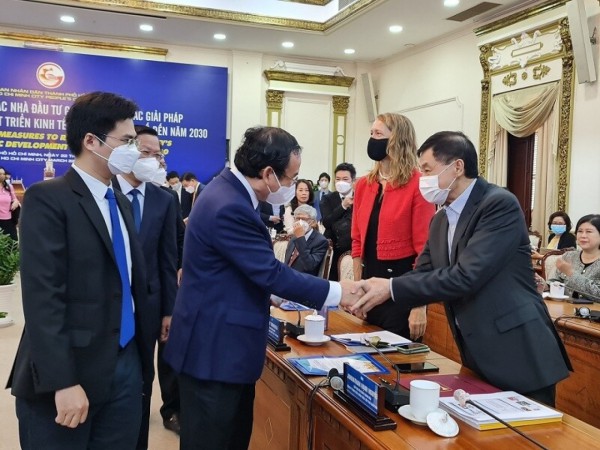Mr. Johnathan Hanh Nguyen Suggested Eight Economic Innovative Projects for Ho Chi Minh City
22 - 03 - 2022
The Financial Center, according to the consulting group’s estimates, can help boost state budget collection by 8-10% or perhaps more.
On March 22, more than 100 local and international businesses attended the People's Committee of Ho Chi Minh City's "Conference to consult with investors and propose solutions to implement the city's socio-economic development path till 2030."

Nguyen Van Nen, Ho Chi Minh City Party Secretary, encourages suggestions and recommendations from local and international businesses.
Mr. Johnathan Hanh Nguyen, Chairman of Imex Pan Pacific Group (IPPG), who was present at the conference, stated that the city's financial background is an important capital channel for the whole economy, while the need for resources to develop for the city in the next 25 years is enormous. However, since domestic resources are still not guaranteed, the resources of foreign investors are critical.
According to Mr. Hanh, it is critical to have innovative preferential policies and mechanisms that are internationally competitive in order to attract reputable strategic investors. Mr. Hanh Nguyen, in particular, proposed eight innovative projects for the city.
The first project focuses on the city's demand for a financial center. According to Shearman & Sterling, a financial and law consulting firm, building a financial center in Ho Chi Minh City will provide many advantages.
Specifically, many of the world's leading financial institutions have gathered. This contributes to the development of the financial market in Ho Chi Minh City to the regional and international level, as a capital support channel for businesses. Support public investment in the city and the provinces of the Mekong Delta. Furthermore, building a financial center will have a spillover effect, enhancing the attractiveness of attracting investment capital and expanding infrastructure, as well as creating supply chains associated with financial services and other high-end commercial activities.
According to the consulting group’s estimates, the Financial Center may boost state budget collection by 8-10%, or potentially more, depending on the activities of investors in the Vietnam International Financial Center.
Along with the first project, IPPG would like to invest in a duty-free shop down the street, which is the second of eight projects. Many countries have adopted this model, which has attracted tens of millions of international shoppers.
By the end of this year, IPPG will have duty-free shops in Hanoi and Da Nang, Vietnam. If there are more duty-free shops on the streets of Ho Chi Minh City, it will help to establish a regular supply of tourists for the city, creating synergies that generate demand and enhance tourist consumption of other services such as hotels, catering, transportation, and so on.
IPPG also suggests investing in a high-end retail complex in the city center, similar to luxury shopping malls in Singapore, Milan, Italy, and Paris, France, as the third project.
The fourth proposed project is to build an urban-service complex, premium outlets, and a thematic amusement park. Premium outlets are popular destinations for both local and international travelers looking to purchase high-end goods for up to 80% off. In addition, a world-renowned amusement park, such as Disneyland, will provide tourists with one-of-a-kind experiences and services.
The next project aims to invest in the Financial and Commercial Urban Area as Singapore's Orchard Road, an upscale shopping area of Singapore. IPPG intends to invest in a financial and commercial urban area in Thu Duc City. There will be branded streets and neighborhoods with representative offices of major banks positioned along the main route. This urban area is connected with Thu Thiem Financial Center, forming a continuous whole that will grow synchronously in accordance with Thu Duc City's long-term planning orientation.
The sixth project is to invest in a VAT refund scheme. The VAT refund for visitors has been spent systematically in countries all over the world, and it is a positive tool to encourage tourist shopping demand. Currently, only IPPG and a few businesses in Vietnam participate in the General Department of Customs' VAT refund scheme, which was introduced in 2015.
Following that, IPPG advised to invest in logistics hubs in Thu Duc City. To achieve the goal of making Ho Chi Minh City a smart city, modern industrial services and the development of a professional freight transport system are critical in this digital age of e-commerce and import-export.
The final project is to fund an artificial intelligence (AI) education program. Artificial intelligence (AI) is a core aspect of the country's future growth. Therefore, investing in AI education and training lays the groundwork and equips young people with the knowledge and skills they will need to become global citizens in the future. We got the copyright of the UBTech Company's Artificial Intelligence in Education Book Series for high school students from K1 to K12, which is now being taught in advanced nations, in order to stay up with the world's research papers on AI education.
Mr. Hanh Nguyen also informed that an alliance of four firms, including IPP Air Cargo, Sasco, VNPost, and Viettel Post, submitted an application to the Department of Planning and Investment of Ho Chi Minh City this morning for the forthcoming Bellazio Logistics development plan.
Other news
24 - 10 - 2025 | Groups news
Johnathan Hanh Nguyen’s corporation has been recognized with two prestigious international awards19 - 08 - 2025 | Groups news
Johnathan Hanh Nguyen’s corporation has been recognized with two prestigious international awards29 - 07 - 2025 | Groups news
The CEO of IPPG signs a strategic partnership agreement with UN Women Vietnam.






